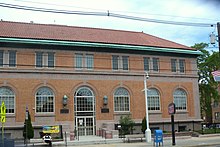Afro-American Historical and Cultural Society Museum

The Afro-American Historical and Cultural Society Museum is located is on the upper floor of the Greenville Branch of the Jersey City, New Jersey Public Library, its collection is dedicated to the African American experience.
The museum has galleries for lectures, special exhibits, and a permanent collection of material culture of New Jersey's African Americans as well as African artifacts. The collection includes books, newspapers, documents, photographs and memorabilia regarding African American history and information about the slave trade in New Jersey, the underground railroad, a replica of an urban 1930s kitchen, the Pullman Porters (a black labor union), the Civil Rights Movement, the NAACP in New Jersey, New Jersey"s historic African American churches, and genealogical records.
The heritage of Jersey City's African American community has been collected and preserved in a special collection, including the city's earliest black residents (in the 17th century Bergen, New Netherland settlement), its role in the Underground Railroad,[1] and the civil rights movement, including Martin Luther King Jr.'s appearances.[2][3][4][5][6][7][8][9]
History[edit]
Begun as a grass-roots committee in the 1970s, the Afro-American Historical Society was formed by Captain Thomas Taylor (president of the Jersey City branch of the National Association for the Advancement of Colored People), Theodore Brunson, (lay historian in Afro-American history),[10] Mrs. Nora Fant (long time and activist resident of Jersey City), and Mrs. Virginia Dunnaway (community worker and teacher). It later became a non-profit organization. In 1984, the Afro-American Historical Society Museum obtained its current home, granted by the trustees of the library. [11] During his term, Glenn Dale Cunningham, the only African American mayor of Jersey City, brought attention to the work and collection of the small museum.
See also[edit]
- Exhibitions in Hudson County
- List of museums focused on African Americans
- List of museums in New Jersey
References[edit]
- ^ "Slavery in Jersey City". Njcu.edu. Retrieved 2013-10-05.
- ^ "Afro-American Historical Society Museum". Cityofjerseycity.org. Retrieved 2013-10-05.
- ^ "JC Free Public Library". Jclibrary.org. 2013-09-03. Retrieved 2013-10-05.
- ^ Afro-American Historical and Cultural Society Museum Archived 2009-06-16 at the Wayback Machine
- ^ "Martin Luther King, Jr. speeches in Jersey City". Cityofjerseycity.org. Retrieved 2013-10-05.
- ^ Nash, Margo (2001-11-04). "JERSEY FOOTLIGHTS - Building on Success". New Jersey: NYTimes.com. Retrieved 2013-10-05.
- ^ "Celebrating Black History Month Public Library local colleges observe African American contributions". Hudson Reporter. Retrieved 2013-10-05.
- ^ "Beyond King and Obama: Visits to Jersey City by Prominent African-American Figures Have Been Constant Through History". JerseyCityIndependent.com. February 8, 2011. Archived from the original on October 14, 2013. Retrieved November 6, 2017.
- ^ "Days before death, King delivered 'dynamic' speech in Jersey City, county official recalls". NJ.com. January 2016. Retrieved November 6, 2017.
- ^ Journal file photo (2012-07-27). "Founder of Jersey City African-American history museum, Theodore Brunson, 87, dies". NJ.com. Retrieved 2013-10-05.
- ^ Jersey City. "JC venues". Americantowns.com. Retrieved 2013-10-05.
